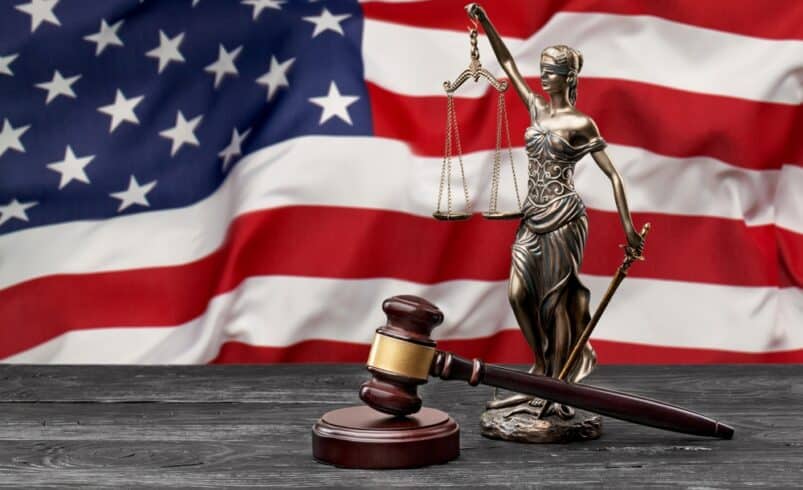Supreme Court Abolishes ‘Chevron Deference,’ Reversal to Benefit Crypto

The Supreme Court overturned a 40-year-old doctrine in a move that legal experts consider to embolden the embattled crypto firms.
The crypto space portrayed a quick celebration on Friday, June 28, when the Supreme Court ruled to abolish Chevron’s deference. The ruling accords with what the federal courts say about ascertaining the scope of administrative agencies.
Supreme Court Abolishes Chevron Deference
The Supreme Court ruling saw a 6-3 decision to overturn the 40-year-old doctrine allowing administrative agencies operating under the president to exercise authority in interpreting laws that Congress left vague.
The ruling delivered a significant win for the conservatives who were doubtful of the Executive Branch’s role in regulation.
Several legal scholars have hailed the ruling as likely to embolden the embattled crypto firms that are battling lawsuits leveled by the Securities and Exchange Commission (SEC).
Duke Law School legal scholar Lee Reiners considers the purported legal gains for crypto to be overblown. He indicated that the SEC’s authority to regulate crypto is linked to its classification as securities.
Reiners indicated that the core issue is ascertaining whether crypto is secure or not. The crypto status lacks bearing on that issue since it is a matter of legal interpretation and not an agency overstepping its scope.
Reiners considers that SEC lawsuits involving crypto issuers and exchanges revolve around securities, and the classification of commodities is unclear. However, overturning the Chevron deference could provide a leeway for discretion to the conservative courts when faced with crypto issues.
Major Questions Doctrine Enhanced
Reiners ruled out that overturning Chevron’s Deference will have tangible implications immediately. Nonetheless, it aligns with the question of statutory limits regarding the SEC’s authority to crypto regulation, as argued by the embattled crypto firms.
The argument against the SEC-brought lawsuit brought by crypto exchange Coinbase indicated that the securities watchdog violated the Major Questions Doctrine. The doctrine prohibited the agencies from exercising authority on questions of political and economic significance without Congress’ authorization.
Coinbase argued that Congress had yet to delegate authority to the SEC to regulate crypto under the provisions of the Securities and Exchange Act (1993). The Coinbase attorneys submitted that crypto assets hardly fit within the framework that the SEC utilizes to regulate securities – Howey Test.
A federal judge in New York held the SEC exercised the authority that Congress bestowed to the agency to regulate instruments sold as investments.
Coinbase hailed the Supreme Court decision on Friday as it portrays recognition of the checks stipulated by the Administrative Procedure Act (APA) on the agencies. The spokesperson indicated that the courts have, in several instances, found SEC violating the APA provisions in multiple contexts.
Coinbase Hails Abolishing Chevron Deference Doctrine
Various parties have in the past established that the SEC contravened the APA, particularly in denying the Bitcoin ETF approval, as proven by the court in August last year. Coinbase is optimistic that the courts will soon scrutinize potential SEC overreach in crypto.
Crypto Council for Innovation (CCI) chief Sheila Warren indicated via a statement that the Supreme Court ruling will directly influence the crypto space. She indicated that the SEC’s role and firepower are subject to questioning since courts can step in.
Coinbase chief legal executive Paul Grewal hailed the essence of the ruling via a post on X, indicating that agencies lack special competence to resolve the statutory ambiguities.
The Supreme Court had on Thursday, June 27, imposed new standards on the Gary Gensler-led SEC. A 6-3 ruling saw the court hold in the SEC v. Jarkesy case that its enforcement actions pursuing monetary penalties are subject to a jury trial.
Legal professor Jack Graves from Syracuse University College considers that Friday’s ruling could bolster the arguments that the SEC oversteps authority. Simultaneously, some federal courts support the SEC’s belief that applying the Howey Test falls within its scope.
Graves indicated that the SEC appears to apply the precedents and Howey test in its enforcement actions undertaken against the crypto firms. However, he considers Friday’s ruling emboldens the Major Questions argument possible as the Supreme Court goes away from the deference.
Zone Crypto Invest provides exposure for numerous crypto businesses, and we invite you to join our community! Connect with us through our Telegram chat for any questions. Given the volatile nature of cryptocurrencies, always conduct thorough research before investing. Many articles on our website are sourced from guest writers or are paid content, and they might not reflect the views of Zone Crypto Invest's internal team. The opinions in these pieces may not always coincide with Zone Crypto Invest's stance. We do not vouch for the accuracy, quality, promotions, or any other aspects showcased on our platform. Please refer to our detailed terms of service and disclaimer for further information.








